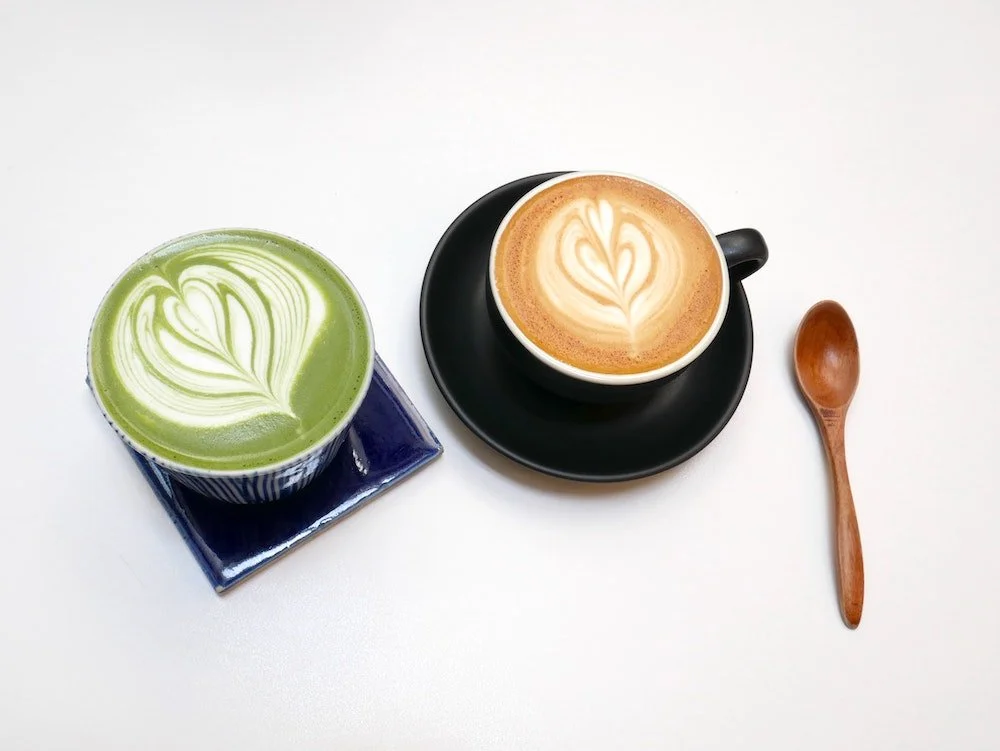Matcha vs. Coffee: Finding Your Perfect Morning Beverage
The morning beverage is a sacred ritual. That first sip awakens our senses, connects us to the present moment, and sets our tone for the day. Many people feel their day doesn’t actually start until (or perhaps they can’t properly function without) their morning cuppa. Coffee consumption is deeply woven into the fabric of American culture, though matcha has been gaining increased presence and popularity. So, which to choose? Let’s take a deeper look at these two plants and their benefits.
Meet the plants
Matcha is whole leaves of the tea plant, Camellia sinensis, ground into a fine green powder. It is abundant in antioxidants, L-theanine, and chlorophyll. Matcha is highly nutritive, as we’re using the whole plant in powdered form. What we call coffee beans are actually the fruit of the coffee plant (coffee cherries), Coffea arabica, that are processed, roasted then extracted (typically via hot water) for our drinking pleasure. The degree of roasting varies: light roasts have a milder flavor and higher caffeine content; dark roasts are more bitter and have a lower caffeine content. Coffee is rich in tannins, alkaloids (like caffeine) and is a highly concentrated source of phenolic acids (including caffeic and chlorogenic acids).
Caffeine content
A standard cup of matcha contains 25-60mg of caffeine depending on the strength of the brew. When we drink a matcha, we’re consuming the whole plant. With the presence of L theanine, we metabolize the caffeine more slowly which also means the caffeine gives us more sustained energy (and virtually eliminates the mid-afternoon crash). Coffee can contain 80-150mg of caffeine depending on the brew method, with ~120mg per standard 8oz cup.
What do they do for me?
A morning cup of coffee provides us with increased attention and alertness and decreased fatigue. In moderation, coffee can help to reduce the risk of cardiovascular disease and diabetes and to increase metabolic rate. Due to the higher caffeine content and acidity, coffee can cause heartburn, headaches, insomnia, anxiety and increased blood pressure and heart rate (caffeine increases cortisol, which contributes to the wired and on-edge feeling). Coffee is also a diuretic and appetite suppressant.
A morning cup of matcha provides us with mood-boosting fuel for the brain. L-theanine supports mental clarity, focus and a calm mood. Chlorophyll boosts oxygen and contributes to matcha’s steady, consistent energizing properties. As a rich source of antioxidants, matcha also promotes cellular repair and tissue health.
Which one is better?
Both matcha and coffee have a lot to offer for our morning rituals and our health. However, coffee has some well-established negative effects, particularly for the caffeine sensitive or for those already prone to anxiety and sleep issues. If this sounds like you, or if you experience any of the above woes from your morning joe, I would encourage you to give matcha a try. Matcha contains less caffeine and is metabolized more slowly. With both, it’s important to be mindful of what else you’re adding to your morning brew, especially processed sweeteners and dairy or creamer.
What to look for
Matcha should be a bright, vibrant green with a taste that is earthy, smooth and creamy. Laka Living matcha, found in the Nourish Department, is the absolute best in the game. Coffee is a very high-spray plant (if you’re not purchasing organic), is prone to oxidation, mold and microtoxins. If coffee is your morning drink of choice, I recommend purchasing the highest quality beans in your budget, ideally organic and from a conscious supplier. Always check the roast date, and if you can, buy whole beans and grind them yourself to ensure maximal freshness and antioxidant content. If all of this sounds like too much to think about, just swing by the Ellwood’s bulk coffee section – they’ve done all the vetting for you, so you know you’re picking up a bag of something delicious.

